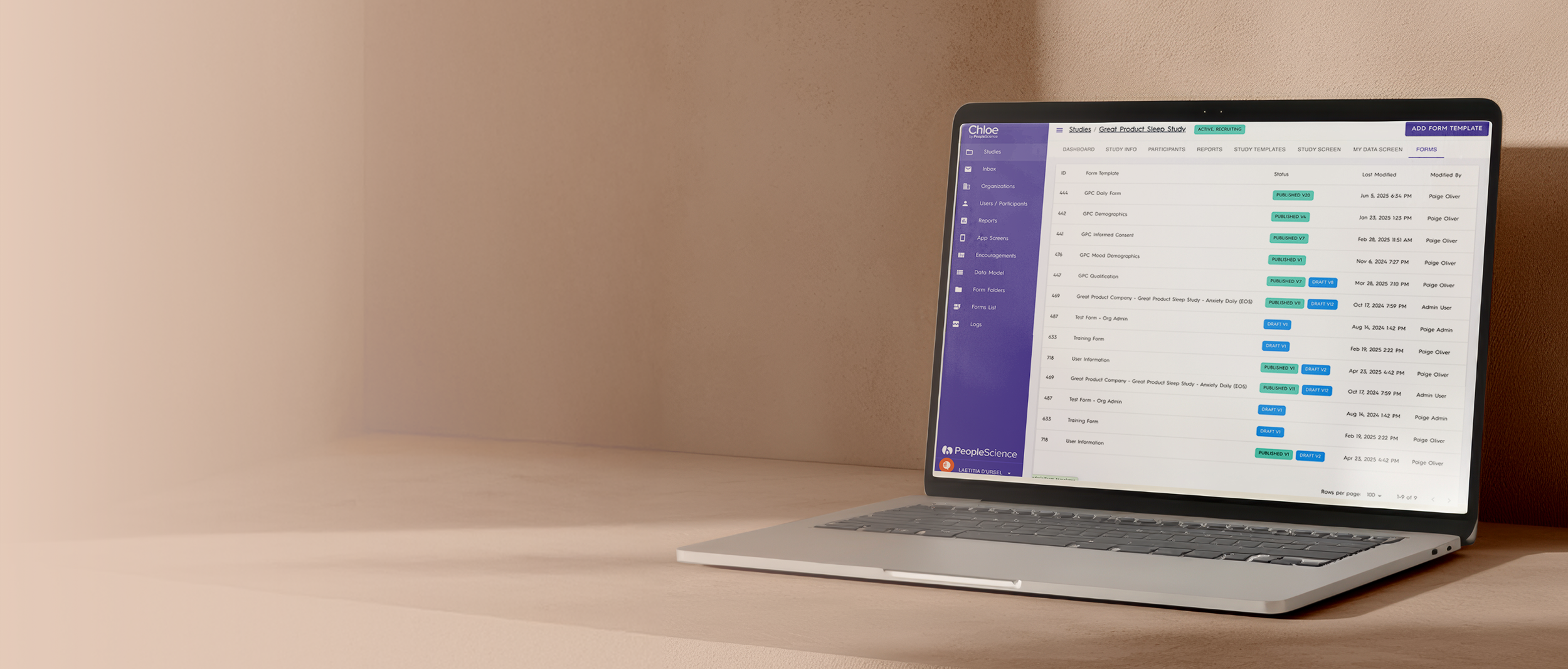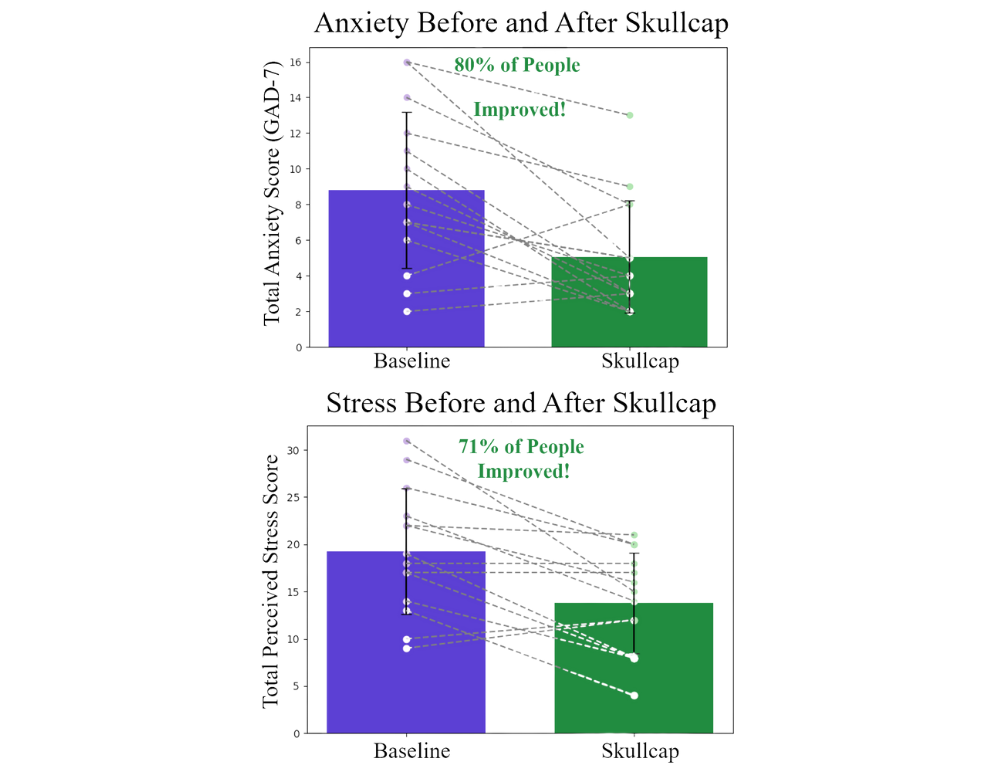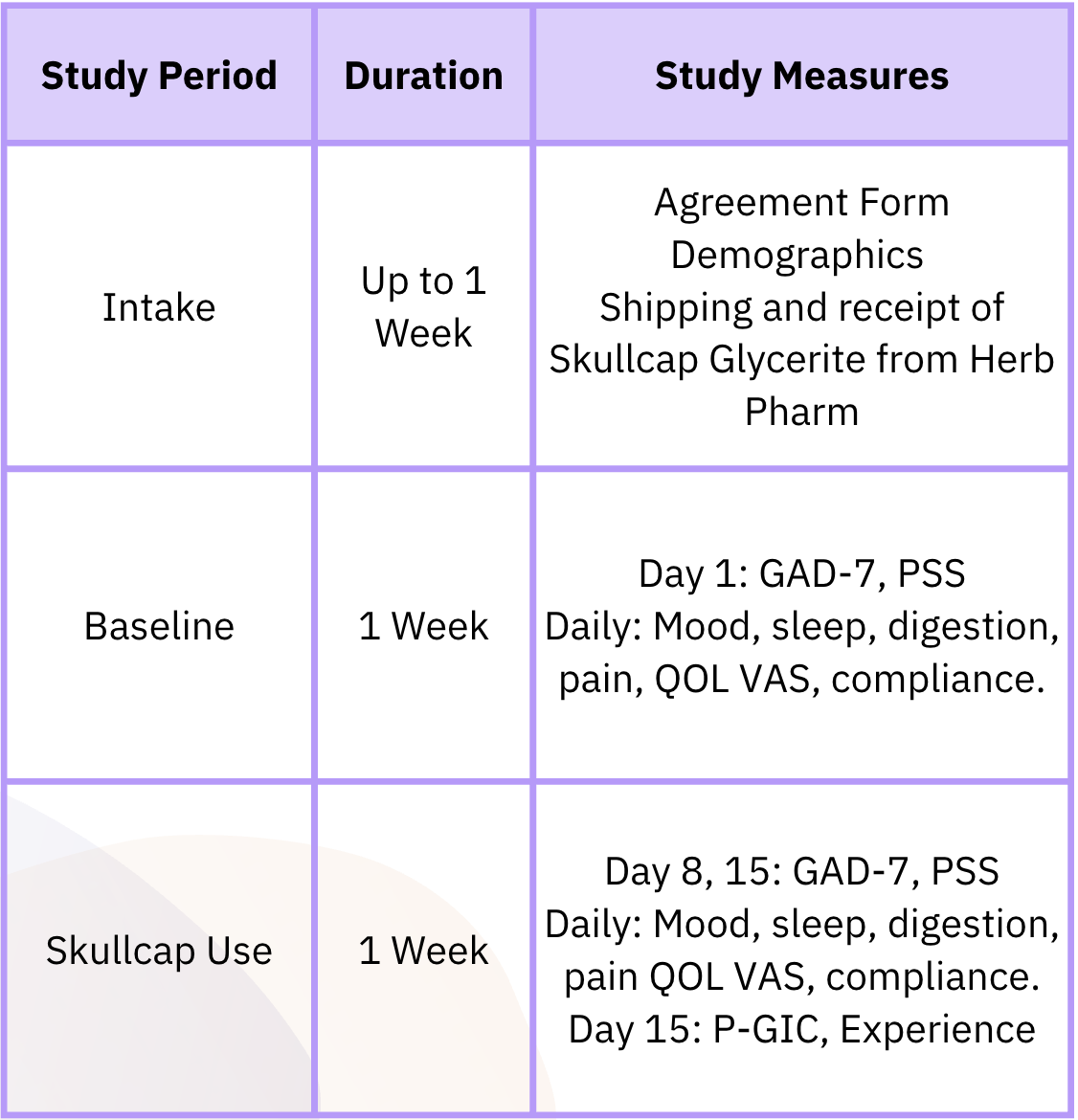CASE STUDY
Chloe for Education:
People Science Brings Participatory Science to School of Herbalism with Land of Verse
Study Overview
Chloe Platform Facilitates Classroom Experiments in a School of Herbalism — From Study Design to Data Collection, Analysis and Sharing Results.
Study Snapshot
Primary focus
participatory research project aimed to help students from the Land of Verse School of Herbal Medicine learn about research methods and use of the skullcap herb through self-study. The study evaluated the effectiveness of HerbPharm’s Skullcap Glycerite on validated metrics of stress and anxiety, as well as daily digestion, sleep, pain and mood.
Participants
18 third year students of the Land of Verse Clinical Herbalism training program
Study Type
Open-label participatory study in an educational context.
Recruitment
All students in the 3rd year class were given the opportunity to participate. The study was proposed and discussed in the classroom.
Duration
Participants completed a 1 week intake and shipping period followed by a 1 week baseline and a 1 week product use period.
Analytical Methods
Non-parametric Mann-Whitney U tests
Key Results
18
Students gained an understanding of basic AB study design and data interpretation, as well as hands-on experience with the use of Skullcap.
GAD-7
Participants’ validated Generalized Anxiety Disorder survey score (GAD-7) was significantly reduced after 1 week of daily skullcap (p=0.02)
PSS
Participants’ validated Perceived Stress Scale score (PSS) was significantly reduced after 1 week of daily skullcap (p=0.03).
87%
of Students Felt Better Overall. 66.7% of participants felt a little better with skullcap, and 20% felt substantially better.
88%
Participants rated the study 8.8/10 and rated the Chloe app 4.5/5.
Study Details
Introduction
The Land of Verse school of Clinical Herbalism embarked on an innovative journey to validate the efficacy of American skullcap (Scutellaria lateriflora)— a perennial herb traditionally used in North American and Chinese herbal medicine to support the nervous system and promote emotional balance. Despite its use, clinical evidence as to skullcap’s effectiveness in improving mood or reducing stress is sparse.
Land of Verse chose to contribute to the body of research on skullcap as part of its curriculum for third year Clinical Herbalism students. Not only did students learn about the herb in the classroom, they had the opportunity to join an open-label study investigating the impact of skullcap on anxiety, stress, sleep, digestion and more. This strategy allowed the class to solidify learnings by combining traditional lecture with personal experience. Additionally, all students learned about the design of basic AB experiments with patients and the interpretation of n=1 and study-wide results.
Study Design & Data Collection
People Science and Land of Verse designed a 3 week, open-label AB participatory research study for students of the 3rd year Land of Verse student class. The study combined validated questionnaires and subjective daily measures for assessing within-individual change over time.
18 students participated with a mean (standard deviation) age of 42 (11) years. 94% of participants were female, 78% were Caucasian, and 5.5% were Middle Eastern, African American, Asian, or multiple ethnicities, respectively.
What is Participatory Research
Participatory research is a form of scientific investigation in health in which the participants take on roles beyond data collection. As part of a participatory research study, participants may help design and administer the trial, discuss research ethics, collect and analyze data, discuss and disseminate results. The opportunity to take on these additional roles blurs the line between scientist and subject, making participatory projects an excellent match for clinician, undergraduate and graduate training, as well as n=1 patient discovery.
To create an easy-to-use participatory research study, People Science utilized its proprietary Consumer Health Learning & Organizing Ecosystem (Chloe).
Study Outcome
The collaboration yielded significant results, demonstrating reductions in subjective stress and anxiety.
Preliminary Clinical Evidence: Although this project was conducted primarily for educational purposes, the results constitute a novel addition to the small body of research on use of skullcap in humans.
Decentralized Trial Efficiency: Utilizing the Chloe app minimized logistical challenges and improved participant engagement, setting a flexible model for future research.
Effective Execution: Completed the trial over a 3-week period. The project demonstrated People Science’s support capabilities, from collaboration on study design to data analysis
“The Skullcap study was an excellent introduction to research for our students. Experiencing the effects of an herb by trying it yourself and carefully reasoning about its impacts leaves students with a lifelong memory. We are excited to have an ongoing partnership with People Science, empowering our students and clinical herbalists to participate in and design studies. The People Science team has been very open, supportive and collaborative with our staff and students, and we are deeply aligned in our mission to bring forth evidence-based knowledge about herbal medicines that can create a positive impact in people’s lives.”
Laura Ash, Clinical Herbalist
Founder & CEO of Land of Verse Herbalism School
Benefits to Verse
Benefits to
Trial Participants
-
Allowed participants to track their experiences with skullcap from home, enhancing accessibility
-
Real-time feedback on individual progress, making the study experience more engaging.
-
Provided personal and group-wide data reports after the study, empowering participants with knowledge of the outcomes.
-
The platform’s usability scored 4.5/5, with participants rating their overall study experience 8.8/10
-
The trial provided the tools of study design and implementation to students in their final year of training as clinical herbalists. These students could then go on to implement simple experiments in their own practices - proving the impact of their recommended interventions and helping fill gaps in herbal medicine research.
Land of Verse continued to expand its annual participatory research program to nearly 100 students in 2024, and collaboration with the Beneficial Plants Research Association in 2025.
-
Land of Verse holds both in person and remote classes. Chloe enabled seamless remote participation, reducing logistical barriers and costs associated with in-person visits
-
Provided instant insights into participant data, allowing timely adjustments to maximize study effectiveness.
-
Structured prompts and reminders helped maintain high data quality and participant adherence throughout the trial.
“This was a very well organized study! Thank you for allowing me to be involved in this research.”
Susan R.
Study Participant
Other Case Studies

Book a Demo
Turn your customers’ everyday health data into your most powerful competitive asset. Explore Chloe: Consumer Health today.

















